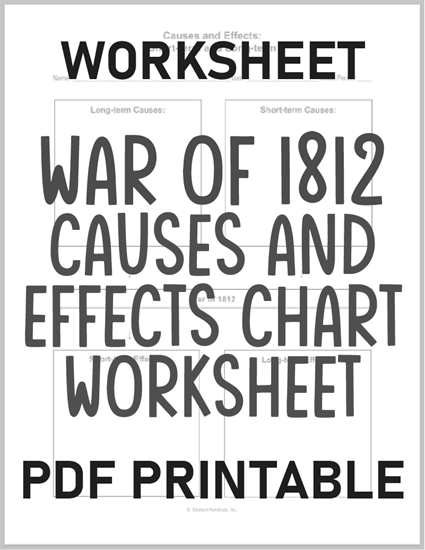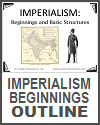| War of 1812 Causes and Effects Chart Worksheet |
|---|
| www.studenthandouts.com ↣ World History ↣ Napoleonic Era ↣ Napoleonic Era Worksheets |
 |
    |
Click here to print. Answers will vary.
The War of 1812 (1812-1815) between the United States and Britain had complex causes and consequences, spanning both immediate grievances and deeper geopolitical tensions.
Short-Term Causes: British Impressment—The Royal Navy's practice of forcibly recruiting American sailors into British service angered the U.S. Trade Restrictions—Britain's blockade of Napoleonic Europe under the Orders in Council crippled American commerce. Frontier Conflicts—British support for Native American resistance (e.g., Tecumseh's Confederacy) hindered U.S. western expansion. War Hawks' Pressure—Nationalist politicians like Henry Clay pushed for war to defend U.S. sovereignty and territorial ambitions.
Long-Term Causes: Post-Revolution Tensions—Lingering resentment from the American Revolution fueled distrust of Britain. Manifest Destiny—Many Americans sought to annex Canada and expand westward, viewing Britain as an obstacle.
Short-Term Effects: Military Stalemate—Neither side achieved decisive victory; the Treaty of Ghent (1814) restored pre-war borders. Hartford Convention (1814)—New England Federalists, opposing the war, debated secession, weakening Federalist influence. Andrew Jackson's Rise—His victory at the Battle of New Orleans (1815) made him a national hero.
Long-Term Effects: Nationalism and Unity—The war fostered American patriotism, symbolized by "The Star-Spangled Banner." End of Federalist Party—Opposition to the war discredited Federalists, leading to their decline. Native American Decline—Without British support, tribes lost resistance efforts, accelerating westward expansion. Industrial Growth—Trade disruptions spurred U.S. manufacturing independence from Britain.
The war ultimately solidified U.S. sovereignty while setting the stage for westward expansion and industrialization.
| Napoleonic Era Books and Films | Napoleonic Era Outlines and PowerPoints |
| Napoleonic Era Maps and Pictures | Napoleonic Era Study Games |
| Napoleonic Era Miscellany | Napoleonic Era Worksheets |
| www.studenthandouts.com ↣ World History ↣ Napoleonic Era ↣ Napoleonic Era Worksheets |














































